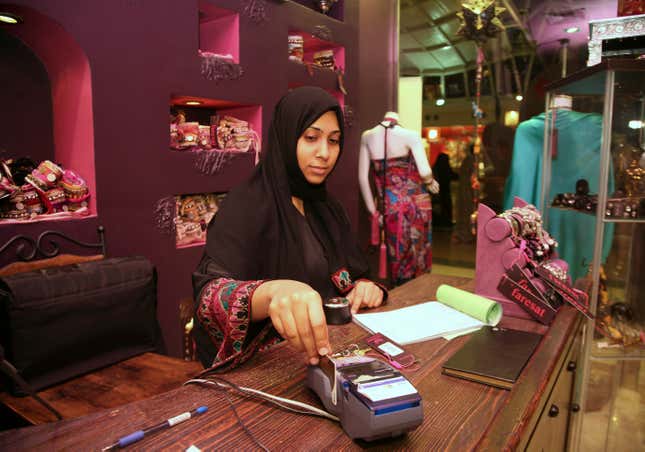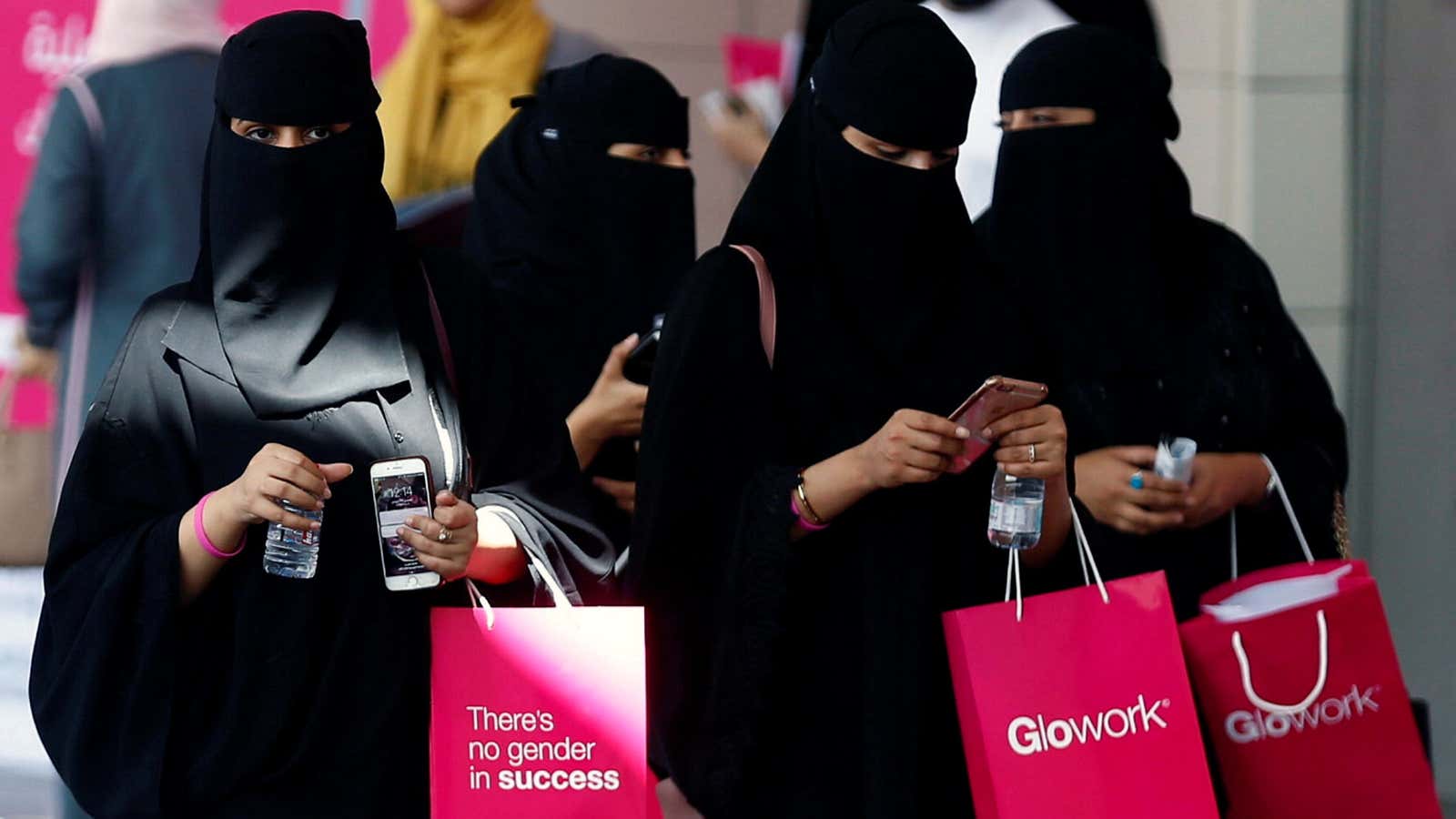Just 23% of Saudi Arabia’s women are in the workforce today. Though that’s a great deal behind the global average of 48%, it’s pretty good for Saudi Arabia, where only 18% of women had jobs or were looking for one in 2010.
That increase is in part due to the work of a recruitment agency called Glowork. With the blessing and backing of Saudi authorities, Glowork has helped tens of thousands of women find jobs in fields like banking, HR, sales, and design.
The organization is at the forefront of a larger cultural shift happening in Saudi Arabia—as working women help boost its economy, the country’s cultural mores are relaxing a little to accommodate new spaces for women.
Glowork was founded by Khalid Alkhudair, a Saudi national and seasoned KPMG executive, who, in the early 2010s, became more aware of how difficult the job market could be for women after his sister struggled to find work. His resolve was also shaped by an earlier episode—in 2010, Alkhudair had advised the Panda chain of grocery stores, one of the largest in Saudi Arabia, to hire women cashiers. But once the company did so, hardliners protested, and Panda moved them off the shop floors.
“People weren’t very happy about that,” Alkhudair told Arabian Business, referring to the decision to hire women cashiers. “At that time, it was the first time that women had worked in a public space outside hospitals.”
The backlash informed Alkhudair’s thinking in Glowork’s early years, when soothing conservative opposition was more urgent (since then, the Saudi government’s support for women in the workplace has helped change attitudes). Glowork at first encouraged companies to set up arrangements where women could work from home.
Its success meant that Saudi authorities took note. In the past near-decade, getting women into the workforce has become a government priority. Glowork played no small role in this—the organization’s leaders were reportedly asked to advise on legislation that would soon expand the number of job fields women were permitted to work in.
“Feminization” by decree
Women have long been in the workforce in Saudi Arabia, but only in very small numbers. In 2011, two decrees from the late King Abdullah made getting more women to find jobs an economic imperative.
In March 2011, Abdullah ruled that Saudis would be eligible for unemployment benefits for the first time ever. The move was generally interpreted as a bid to prevent any revolutionary fervor, which had swept Arab countries like Tunisia and Egypt months earlier, from crashing onto Saudi shores. But who claimed unemployment took many aback—more than 80% would turn out to be women, in a country with a population that is 43% female. Having so many female claimants showed that a larger, systemic imbalance might be at play.
Three months later, in June 2011, King Abdullah decreed that lingerie shops would only be staffed by women. The measure served two goals: getting more women to work, and ending a longstanding practice of hiring exclusively male sales clerks, which made nearly all Saudi women uncomfortable shoppers. Both conservatives, who for years have disliked interacting with male clerks, and reformists who wanted more job fields opened to women, welcomed the decree.
Not long after, the Ministry of Labor ordered stores that carried other products targeted towards women, including cosmetics and wedding dresses, to hire all-female staff, a process the kingdom called “feminization.” Shops that did not comply were forced to shut down.

Glowork was a child of these circumstances, and the beneficiary of fortuitous timing. It was founded in May 2011, in the period between these two decrees. Many more fields were about to be open to women—and Saudi authorities were likely keen to get more off unemployment.
“Well actually… we started with a partnership with the Ministry of Labor and HRDF, which is the Human Resources Development Fund, to place or find jobs for those who are registering in the [unemployment] system,” said Ghaida AlMutairi, Glowork’s female executive director, and a former event manager at the company.
A fair to remember
In 2013, in an effort to help more women find work, Glowork greatly expanded its offline operations. That year, it held its first A Step Ahead career fair, which is the largest such event for women in the Middle East.
In the six years since, more than 180,000 women—tens of thousands of job-seekers, along with representatives from about 650 companies—have attended the annual event. Between 2013 and 2017, nearly 10,000 attendees found jobs through the fair. AlMutairi said these figures are conservative ones.
More than 9,600 women have also attended Glowork’s workshops at the annual fair. Topics of those workshops range from tips about how to better market your skills to resume-writing help.
These workshops are free for attendees, and a major part of Glowork’s efforts towards empowerment. “[If] there is a lady who attended this workshop, and managed to write a better CV… then this CV that she wrote got her a job, then that is an achievement for us too,” AlMutairi said.
Glowork is a privately-held business that gets paid for every worker it helps recruit. But it also continues to thrive because of support from the Ministry of Labor. AlMutairi said the government provides financial assistance and supplies conference speakers for the events.
Saudi Arabia’s rulers see women as a core part of the kingdom’s ambitious goal to transform the Saudi economy. Under the Vision 2030 plan, Saudi officials are aiming to boost (pdf) the number of women participating in the workforce to 30% by the end of the next decade.
Many women are on board with that goal, and the related liberalization of Saudi society. On a practical level, meeting it would yield major economic benefits to Saudi Arabia, both by growing the economy, and by reducing the number of women receiving unemployment benefits. It’s something that ties Glowork with another major Saudi initiative—last year’s decision to end the world’s only female driving ban.
Companies often cite problems finding qualified candidates as an issue in doing business in the kingdom. The decision to lift the driving ban has opened up an additional pool of workers, many of whom are well educated (women outnumber men at Saudi universities). One economist at Bloomberg forecasts that women’s permission to drive could add nearly 1% to GDP a year until 2030, or $90 billion to the economy in that period.
Ladies get to work
In 2017, the Saudi Stock Exchange, the largest in the Arab region and which the government set up in 2007, appointed the first woman to head it. Similar initiatives to put women in positions of power have won praise from Saudi women—and Glowork.
“This is a great message for the private sector,” said AlMutairi. “So it’s like the government being a role model for all the private sector to follow as well.”
Nonetheless, Glowork hopes to continue scaling up its business to help more women find work. The company, which started with just three employees, currently has about 50 full-time staff members and is in the process of redeveloping its job portal site that it hopes will go live later this year, before this year’s A Step Ahead job fair kicks off.
There are plenty of women looking for work, and Glowork hopes to help them find employment. But there’s a long way to go before there are enough jobs, especially high-powered ones, open to them in Saudi Arabia. AlMutairi is confident that things are moving in the right direction. And when you look at the progress Glowork has made, it’s not hard to understand her optimism.
Until recently, “it wasn’t something normal to see women working in a supermarket or selling makeup in a store,” AlMutairi pointed out. That’s already changing, she said. There’s nowhere for women to go but up.
